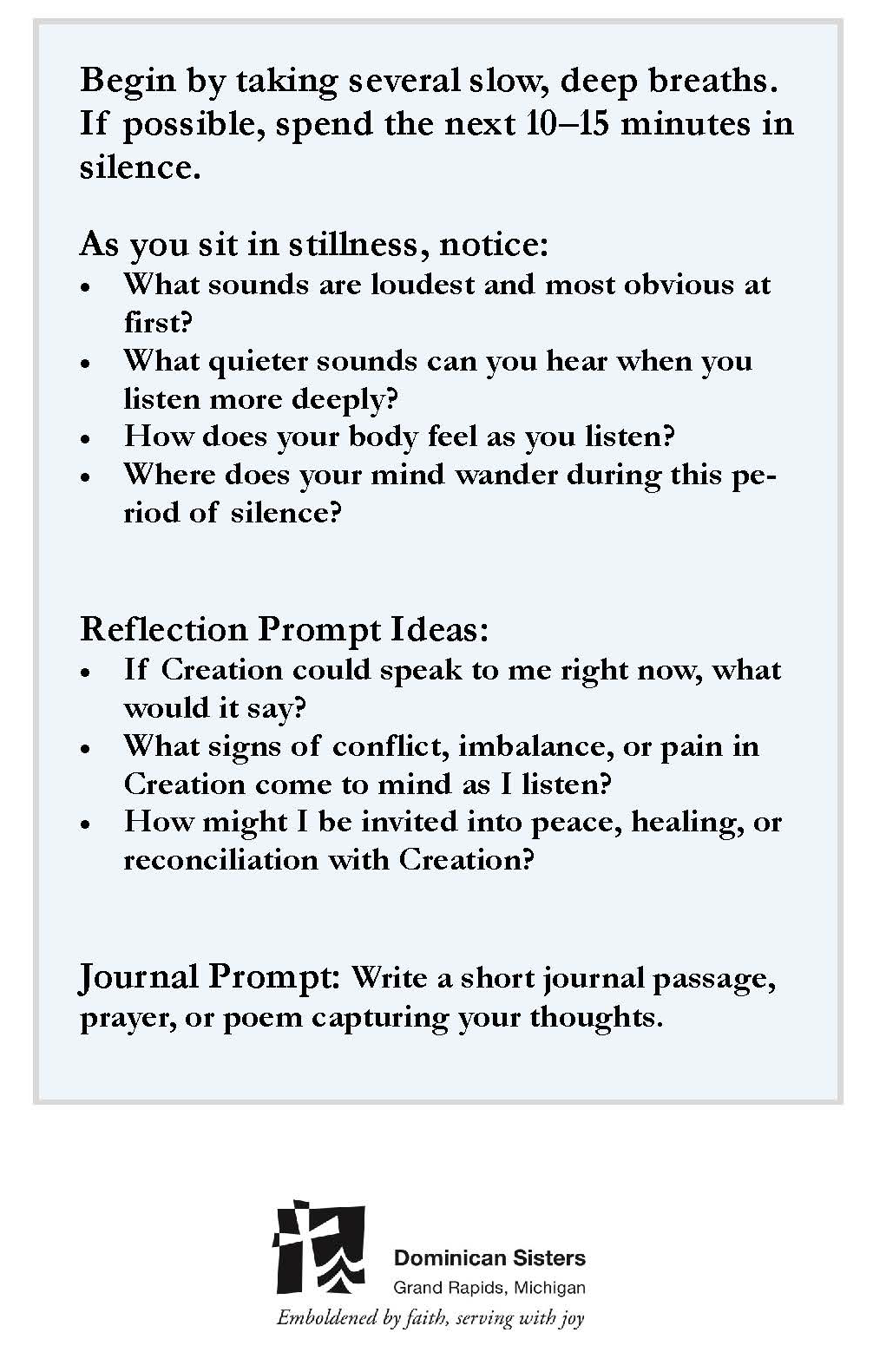Find Season of Creation Reflection, Prayer, and Action prompts all this month. We hope these resources will guide and inspire your journey to a renewed relationship with God and Creation.
Week #2 Reflection: Listening for Creation’s Voice


Choose a quiet spot, preferably outside. Alternatively, find a quiet spot indoors.
Position yourself near a source of natural beauty, such as a tree, garden, plant, or body of water. If indoors, you might listen to the flow of a tabletop fountain, the flicker of a candle flame, or a recording of nature sounds. You could also sit near an open window to take in the sounds from outdoors.
Begin by taking several slow, deep breaths. If possible, spend the next 10–15 minutes in silence.
As you sit in stillness, notice:
• What sounds are loudest and most obvious at first?
• What quieter sounds can you hear when you listen more deeply?
• How does your body feel as you listen?
• Where does your mind wander during this period of silence?
Reflection Prompt Ideas:
- If Creation could speak to me right now, what would it say?
- What signs of conflict, imbalance, or pain in Creation come to mind as I listen?
- How might I be invited into peace, healing, or reconciliation with Creation?
Journal Prompt
Write a short journal passage, prayer, or poem capturing your thoughts.
Prayer: Prayer for Wisdom and Justice
in Addressing External Debt
Loving and Gracious God,
Help us understand that we have the power and the duty to act against the injustices that bind people in poverty and debt.
Grant us the courage to challenge the structures that perpetuate these conditions, and the strength to work tirelessly for a world where every person can achieve their full potential.
Inspire our hearts with Your compassion and justice. Empower us to be bearers of hope and agents of change. Together, may we help bring forth solutions rooted in fairness and equity; economic systems that uplift and create hope for the downtrodden; and a future where every nation can walk the path of sustainable development, free from the shackles of debt.
May we be instruments of Your peace, secure in the faith that, through our collective effort, poverty can be overcome.
Amen
~ Fr. Charles Chilufya, SJ, Zambia (Caritas Internationalis)
Action — Helping to Heal the Earth: Recycling
Recycling conserves natural resources and energy (just 10 plastic bottles can power a laptop for 25 hours), reduces greenhouse gas emissions (saving 193 million metric tons of CO₂ annually), and boosts our economy—supporting over 681,000 U.S. jobs and $37.8 billion in wages (EPA). But recycling also protects the poor and vulnerable in surprising ways. Since 1990, most of Grand Rapids’ municipal solid waste has gone to a waste-to-energy incinerator rather than a landfill, and incineration has been linked to cancers, birth defects, and other serious health risks—especially in neighborhoods downwind of these facilities (Cornell Journal of Law & Public Policy). By recycling as much as possible, you are caring for creation and defending those most at risk.
Study and learn what you can recycle locally:
- DSGR- Waste Management “Recycle Right” https://www.wm.com/us/en/recycle-right
- City of Grand Rapids Residential Information Kent County Residential Recycling & Education Center https://www.kentcountymi.gov/382/Residential-Recycling
- All others – Contact your hauler for more information on recycling
Find Season of Creation Reflection, Prayer, and Action prompts all this month.
-We hope these resources will guide and inspire your journey to a renewed relationship with God and Creation.

